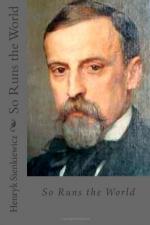I shall not mourn, although I appreciate the justified complaint about objectivity in belles lettres. But now there is no question what poetry will be; there is the question whether it will be, and I believe that society, being tired with Zola’s realism and its caricature, not with the picturesqueness of Loti, but with catalogues of painter’s colors; not with the depth of Ibsen, but the oddness of his imitators—it seems to me that society will hate the poetry which discusses and philosophizes, wishes to paint but does not feel, makes archeology but does not give impressions, and that people will turn to the poetry as it was in the beginning, what is in its deepest essence, to the flight of single words, to the interior melody, to the song—the art of sounds being the greatest art. I believe that if in the future the poetry will find listeners, they will repeat to the poets the words of Paul Verlaine, whom by too summary judgment they count among incomprehensible originals:
“De la musique encore et toujours.”
And nobody need be afraid, from a social point of view, for Sienkiewicz’s objectivity. It is a manly lyricism as well as epic, made deep by the knowledge of the life, sustained by thinking, until now perhaps unconscious of itself, the poetry of a writer who walked many roads, studied many things, knew much bitterness, ridiculed many triflings, and then he perceived that a man like himself has only one aim: above human affairs “to spin the love, as the silkworm spins its web.”
S.C. DE SOISSONS.
“THE UNIVERSITY,” CAMBRIDGE, MASS.
PART SECOND
SO RUNS THE WORLD
ZOLA.
I have a great respect for every accomplished work. Every time I put on the end of any of my works finis, I feel satisfied; not because the work is done, not on account of future success, but on account of an accomplished deed.
Every book is a deed—bad or good, but at any rate accomplished—and a series of them, written with a special aim, is an accomplished purpose of life; it is a feast during which the workers have the right to receive a wreath, and to sing: “We bring the crop, the crop!”
Evidently the merit depends on the result of the work. The profession of the writer has its thorns about which the reader does not dream. A farmer, bringing the crop to his barn, has this absolute surety, that he brings wheat, rye, barley, or oats which will be useful to the people. An author, writing even with the best of faith, may have moments of doubt, whether instead of bread he did not give poison, whether his work is not a great mistake or a great misdeed, whether it has brought profit to humanity, or whether, were it not better for the people and himself, had he not written anything, nothing accomplished.
Such doubts are foes to human peace, but at the same time they are a filter, which does not pass any dirt. It is bad when there are too many of them, it is bad when too few; in the first case the ability for deeds disappears, in the second, the conscience. Hence the eternal, as humanity, need of exterior regulator.




